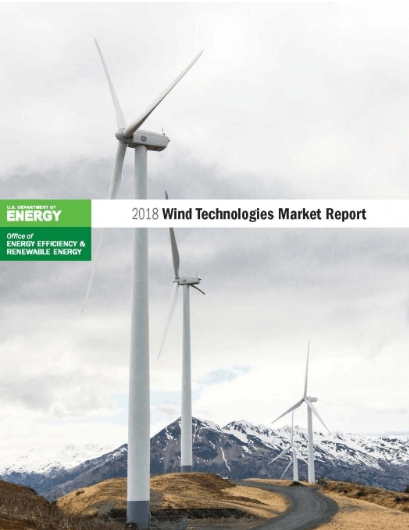The U.S. Department of Energy (DOE) has released annual market reports documenting data and trends in wind installations, technologies, costs, prices, and performance through the end of 2018 for three sectors: utility-scale land-based, offshore, and distributed wind.

The 2018 Wind Technologies Market Report — now in its 13 consecutive year — provides an overview of developments and trends in the U.S. wind power market, with a particular focus on the year 2018.
“Onshore wind energy installation continues to grow across the country, and this Administration has proven that we can pursue renewable energy advancements and deployment, particularly wind energy resources, which are predicted to surpass other sources of renewable power generation this year,” said Under Secretary of Energy Mark W. Menezes.
He added: “And with over 25 gigawatts in the development pipeline, U.S. offshore wind is poised to be a significant part of our comprehensive energy portfolio in the coming years.”
The utility-scale land-based wind sector had another strong year with 7,588 MW installed during 2018, accompanied by record low costs and prices. The U.S. distributed wind sector now stands at 1,127 MW from over 83,000 wind turbines across all 50 states. And the U.S. offshore wind industry has a pipeline of 25,824 MW in various stages of development.
The 2018 Wind Technologies Market Report, prepared by DOE’s Lawrence Berkeley National Laboratory, found the following:
- The U.S. wind industry installed 7,588 MW of capacity last year, bringing total utility-scale wind capacity to over 96 GW.
- Wind industry employment is at an all-time high, supporting 114,000 jobs.
- In total, 41 states operated utility-scale wind projects. Texas leads the nation with nearly 25 GW of wind capacity, while California, Iowa, Kansas, and Oklahoma have more than 5 GW.
- Wind energy provides 6.5% of the nation’s electricity, more than 10% of total generation in 14 states, and more than 30% in Iowa, Kansas, and Oklahoma.
- The trend of installing wind turbines that are larger and more powerful continued in 2018. (Read more about these size and performance trends.)
- The price of wind energy being sold in long-term contracts is at an all-time low. Wind power purchase agreement (PPA) prices are below two cents per kilowatt-hour, driven by a combination of higher capacity factors, declining turbine prices and operating costs, low interest rates, and the production tax credit.
The 2018 Offshore Wind Technologies Market Report, prepared by DOE’s National Renewable Energy Laboratory, found the following:
- The U.S. offshore wind project development pipeline grew to a potential generating capacity of 25,824 MW across 13 states, including the Block Island Wind Farm commissioned in 2016.
- Projects totaling 21,225 MW have exclusive site control, meaning the developer has a lease or other contract to develop the site. Most of these projects are on the Eastern seaboard, with one in the Great Lakes.
- California and Hawaii have several early-stage floating offshore wind projects in the planning phase.
- The Department of the Interior’s Bureau of Ocean Energy Management (BOEM) auctions for three lease areas off the coast of Massachusetts brought in winning bids of $135 million — more than three times the value of previous BOEM auctions — indicating strong interest and confidence in the U.S. offshore wind market.
- Offtake prices for the first commercial-scale U.S. offshore wind project — Vineyard Wind off the coast of Massachusetts — came in lower than expected at $65 to $75 per megawatt-hour.
- Technology trends toward larger turbines continued, with offshore turbines installed globally in 2018 averaging 5.5 MW, and turbines with capacities of 10 to 12 MW coming to market in the next couple years. (Read more about offshore trends.)
The 2018 Distributed Wind Market Report, prepared by DOE’s Pacific Northwest National Laboratory, highlights the following:
- Distributed wind power is used at or near where it is generated, as opposed to wind power from wholesale generation, where power is sent to consumers via transmission lines and substations.
- Employed by households, schools, farms, industrial facilities, and municipalities, distributed wind doesn’t only refer to small-scale turbines; it includes any size turbine or array of turbines that generates power for local or on-site use.
- U.S. wind turbines in distributed applications reached a cumulative installed capacity of 1,127 MW in 2018. This capacity comes from over 83,000 turbines installed across all 50 states, Puerto Rico, the U.S. Virgin Islands, and Guam.
- The trend of using larger wind turbines in distributed applications continued in 2018. The average capacity of large-scale turbines installed in distributed applications in 2018 was 2.1 MW — almost double the capacity of turbines used in 2003.
- Commercial and industrial distributed wind projects increased in 2018, representing 29% of total project capacity. Distributed wind for utility customers remained the most prevalent use, representing 47% of capacity in 2018. Read more about the customers of U.S. distributed wind.
- Of small wind turbines (nameplate capacity up to 100 kilowatts) deployed in the United States, very small turbines—less than 1 kW — are contributing an increasingly larger percentage of both the total number of turbines (99%) and capacity (47%) of small wind projects. These systems are often used for battery charging and are sometimes integrated with solar PV panels to power remote infrastructure.
Find more information on the three wind market reports here.
For more information on DOE’s wind energy research and development efforts, visit DOE’s Wind Energy Technologies Office.
Filed Under: Community wind, News, Offshore wind




